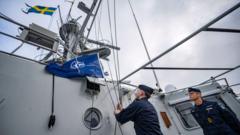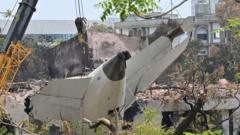Swedish authorities are investigating suspected sabotage of an undersea telecoms cable in the Baltic Sea, amidst concerns of increased attacks since the Ukraine conflict began. The damage to the cable, owned by Finnish operators Cinia, has raised alarms regarding the security of undersea infrastructure, prompting NATO's recent monitoring operations.
Sweden Probes Undersea Cable Sabotage Amid Rising Tensions

Sweden Probes Undersea Cable Sabotage Amid Rising Tensions
Investigation initiated into damaged telecoms cable linking Germany and Finland as NATO enhances Baltic Sea monitoring.
Sweden's police force has begun a detailed investigation into suspected sabotage involving an undersea telecoms cable in the Baltic Sea that connects Germany and Finland. This increased vigilance comes in the wake of multiple reports of damage to undersea infrastructures, such as cables and gas pipelines, after Russia's invasion of Ukraine in 2022. In response, NATO initiated a monitoring mission on the Baltic Sea last month to keep an eye on the situation, emphasizing its commitment to safeguarding critical undersea networks.
The site of the suspected incident lies east of Gotland, Sweden's largest island. As part of their investigative efforts, the Swedish coastguard deployed a research vessel to assist in assessing the situation and determining the extent of the damage. Swedish Prime Minister Ulf Kristersson acknowledged the incident, highlighting its seriousness in the context of the ongoing security threats in the region.
Finnish telecom firm Cinia, which owns the troubled cable, reported experiencing minor damage but noted that the cable continues to function. This marks the third instance of damage to the cable within a few months, with the previous severance occurring in November of the last year. The coastguard is still investigating the timeline of the recent damage, but authorities suspect that extensive maritime activity, including civilian vessels dragging their anchors, may be at fault for some incidents.
Despite ongoing speculations regarding Russian involvement in such breaches, several reports indicate that various factors such as inclement weather and human error may be contributing significantly to the risks posed to undersea infrastructure. The Bulgarian vessel, the Vezhen, was previously cleared of any wrongdoing following its interaction with the cable earlier this month.
The situation remains dynamic, with European leaders urging vigilance and cooperation amongst allies to secure critical maritime routes and prevent further disruptions tied to geopolitical strife.



















